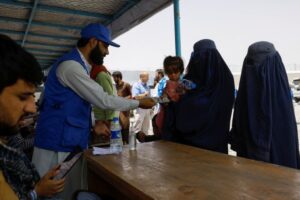
A recent report by Crisis Group urges Western nations to establish a “liminal zone between pariah and legitimate status” to address the ongoing humanitarian crisis rather than withdrawing money to Afghanistan in response to the Taliban’s restrictions on women’s education and employment opportunities at NGOs.
The report, which was made public on Thursday, mainly concentrated on two Taliban decrees made public in December: the first prohibited Afghan women from enrolling in private and public universities, and the second prohibited them from working for domestic and foreign NGOs. The actions sparked demonstrations and widespread condemnation while signaling the potential end of the Taliban’s early willingness to cooperate with the international world after seizing power in the nation in August 2021.
The report’s authors claim that international aid from significant international government sources has being reviewed in response to the Taliban’s crackdown. While having immediately halted following the group’s ascent to power, that aid had resumed because of worries over the country’s estimated 40 million people’s pervasive starvation and poverty.
As a result of the Taliban’s restrictions on women’s basic freedoms, donors are fleeing Afghanistan, according to Graeme Smith, Senior Consultant for Afghanistan at Crisis Group.
But decreasing funding in order to advocate for women’s rights will simply worsen the situation for all Afghans, he continued. The best method to combat the misogyny of the Taliban would be to discover measures to lessen the harms done to women and other vulnerable groups.
According to the report, which was based on dozens of interviews with “Afghan and international women activists, current and former Afghan officials, teachers, students, aid workers, human rights defenders, development officials, diplomats, business leaders, and other interlocutors,” Western governments warned aid organizations of a growing sense of donor fatigue towards Afghanistan in the second half of 2022. The governments it was referring to were not identified.
The authors further warned that following the most recent rights rollbacks, “many Western politicians fear voters will not accept the idea of their taxes helping a country ruled by an odious regime,” while adding that “consultations in January 2023 among major donors produced initial thinking that aid should be trimmed back to send a message to the Taliban, although the governments involved did not agree on which budgets to cut”.
Once more, the study omitted naming the in question nations.
In response to the restriction on NGO personnel, the United Nations, which has already had to scale back certain humanitarian programs, has made an appeal for $4.6 billion to aid Afghanistan. The amount is the most amount ever requested from a single nation. Two-thirds of the nation’s population, or 28 million people, are in need of humanitarian assistance, the UN has warned.
Western countries, however, “seemed prepared to fall severely short,” according to a Crisis Group warning.
In reaction to the December directive, alternatives explored have included “deepening sanctions, withdrawing aid or levying other types of punishment in response,” the report’s authors stated.
In response to the December edicts, the G7 club of the world’s richest nations had stated there would be “consequences for how our countries engage with the Taliban,” they pointed out. According to the study, the coalition gave $3 billion in aid to Afghanistan in 2022.
Secretary of State Antony Blinken warned that there would be consequences if the Taliban’s treatment of women was not changed after the United States placed a slew of fresh sanctions on them in October.
The report’s authors argued that any strategy that included immediate aid cuts in an effort to undermine the Taliban’s power would worsen the situation for individuals who have already been the subject of recent Taliban actions.
Proving such hypotheses would entail a risky bet involving perhaps millions of lives. Regardless of the outcome, Afghan women would bear a disproportionate share of the costs of the bet because they bear the brunt of the crisis, according to the research.
It was noticed that child marriages tended to rise during times of greater adversity and that “women and girls frequently get the least amount of food in Afghan homes, which implies that in times of scarcity they are most vulnerable to starvation and sickness”.
Instead, the Taliban’s “overheated rhetoric about a titanic conflict between Islam and the West” would be undermined by continuing to provide humanitarian help while supporting longer-term development aid, according to Crisis Group.
The authors also highlighted the Taliban’s opaque decision-making process and cautioned against hoping for outside pressure to influence the group’s strategy. They observed its secretive leader, Hibatullah Akhundzada, has appeared to insist on the harsh rules out of “personal belief and to demonstrate his power over the movement and the country”.
The goal of persuading the Taliban to behave like a globally recognized government should be put on hold for the time being, the report stated, as the West weighs its alternatives.
The Taliban’s rules are “derived not just from their unique understanding of Islam, but also from features of local culture,” the statement continued, so there is minimal tolerance for competing viewpoints within the Taliban leadership.
Political negotiations with the Taliban to establish a “roadmap” for normalization have all but ceased. However, it is still unknown how much money the organization may be taking in through drug trafficking and other types of smuggling, raising the question of how much the sanctions will actually impact the top levels of leadership.
“Western officials need to speak out in support of Afghan girls and women. They should be careful to avoid self-defeating policies at the same time, the report said.
“Real actions that directly benefit Afghan women and significantly better their lives would be preferable to irate denunciations of the Taliban’s misguided policies,”
The writers continued, “The Taliban should develop a better method of decision-making rather than succumbing to the whims of a leader who has demonstrated his willingness to oppress women and obstruct the reconstruction of his homeland. The future of Afghanistan seems dismal until that occurs.




